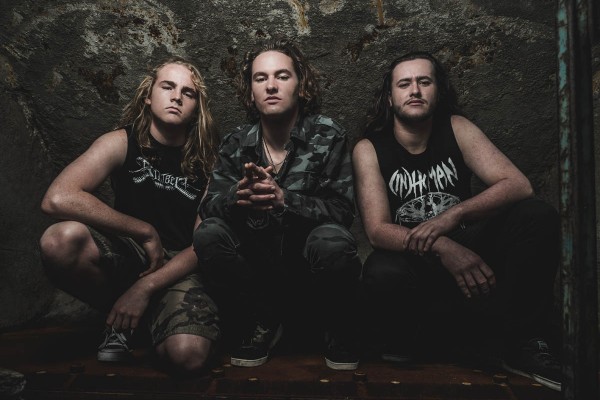The D&B that usually fills the Octagon is infiltrated by the intense throbbing of heavy metal as Alien Weaponry begin their set at 50 Gorillas. The seemingly flimsy double doors give way to a wave of deafening drums, intense riffs and language-swapping vocals.
Packed to the rafters, metalheads from across Dunedin gather to hear the internationally acclaimed band play their unique fusion of Te Reo Māori and English songs. A couple of hours before this all began, I spoke to the three members of Alien Weaponry about their tour, and how the band achieved international recognition following their SmokefreeRockquest and Pacifika Beats wins in 2016.
In the green room of 50 Gorillas, following a similarly ear-splitting sound check, the band members floated down the stairs one by one. Louis and Ethan, vocals and bass, respectively, arrived first, with Henry, the drummer, following after sorting out various technical affairs. After a brief flurry of excitement surrounding the arrival of ginger beer, they settled down and we got started.
One of their later stops on yet another tour, this one much closer to home than they’re used to as of late. With tours in Europe and the USA, the band isn’t unfamiliar with travelling, but definitely missed their NZ roots. “Pies, the ocean and the vibes,” Louis said with the passion of a suffering musician. “The slang and the culture, you can’t just go up to someone and say ‘aw chur bro.’ They just don't know what you’re saying.” Despite the homesickness, their time away (especially in Europe) ticked off quite a few bucket list items. The youngest band at Wacken Open Air, the world’s largest metal concert, was quite a milestone. However, the band wishes people would focus less on their age and more on their music. Ethan shrugged when I brought it up saying, “you try not to make a big deal of it”.
Another surprise to the band was just how far their music had reached. When discussing the tour itself, Ethan spoke about his surprise seeing just how many people knew their music. “The most buzzy thing, for me at least, was when we came from New Zealand, the biggest show we had played here was our album release party, and it was insane to us that nearly 400 people came to our show, and we knew lots of them. But when we went to the other side of the world and there are all these German and Spanish people rocking up to our shows and knowing who we are, it was real weird.” Nodding emphatically, Louis added, “they’re all out there singing in Māori, and they come up after the show and can barely speak English, that’s some dedication.”
The tour was a huge learning experience for the boys, with the biggest learning curve being around stamina. Henry rolled his head back in memory of the exhausting couple of weeks, “especially on the US tour, it was 21 shows in a month, so normally a show every day and every few days we’d have a day off”.
One of the elements that make Alien Weaponry such a standout in the New Zealand metal community, and around the world, is their inclusion of the Māori language. Louis and Henry’s father has been telling them stories about their family since childhood. Henry spoke about the integration of Te Reo Māori into their music. “As we got older, they kept telling us these stories and we found them a lot more interesting and the reason we started writing in Māori was because of Pasifika Beats. Like, we saw the competition and thought we’d write a song in Māori and try writing it and it kinda went from there.” Seeing an unclaimed niche in the music scene is what really kick-started their career, and lead them to be the only band to win both Smokefree Rockquest and Pasifika Beats.
With new music in the works and another couple of tours being created behind the scenes, it's safe to say that Alien Weaponry’s hold on the metal industry won’t waver any time soon. Their bridging of history and music, acknowledging their own culture and the use of the Māori language is what sets them apart from the rest.
Their latest album “Tū” is on iTunes and Spotify.
Photo: Piotr Kwasnik







